Donald Trump seems to want to give Russian President Vladimir Putin almost everything he wants. This week, there was a lot of news about efforts to end the war in Ukraine.
A source told CNN the Trump administration is ready to recognize Russian control of Crimea as part of the U.S. framework to end the war. The Telegraph reported that Trump is proposing that Putin keep large swathes of Ukrainian territory, with the U.S. to recognize Crimea as officially part of Russia. Axios then said that the U.S.-backed plans to end the war include unofficial U.S. recognition of Russian control of nearly all areas occupied since the 2022 invasion.
It’s no coincidence that Russia suddenly says it’s willing to negotiate with Ukraine bilaterally. The Financial Times reports that Putin told U.S. Special Envoy Steve Witkoff that Moscow could halt its invasion of Ukraine at the current front lines as part of efforts to reach a peace deal. A Kremlin spokesperson said Russia is “satisfied” by hearing from Washington that Ukraine’s NATO membership is “out of the question.” Russia is willing to talk when it believes it will get what it wants. Meanwhile, the relentless bombing of Ukraine hasn’t stopped. I’ve been reporting on efforts to end the war, so I’ll have an article in your inbox next week.
But this week, I want to talk about El Salvador, the country now run by a millennial bitcoin enthusiast, where Trump is deporting hundreds of men without due process. I briefly lived in El Salvador in 2006, when the country’s political culture was emerging tentatively from the aftermath of the 1992 peace agreement.
Gang violence was a problem, in large part because the United States deported the so-called “maras” off the streets of Los Angeles to El Salvador, even though many of them had arrived in the U.S. as children. After all, Salvadoran refugees founded MS-13 in LA during the 1980s. The gangs have always been a product of U.S. involvement in El Salvador, starting with Washington’s support of right-wing death squads during the civil war and later the marginalization of refugee communities.
During the months I spent in El Salvador in 2006, I worked as an election observer and participated in frequent political rallies. There were protests against the Atonio Saca government every Friday in San Salvador’s central Plaza Cívica. People climbed on top of statues, sang songs, and burned flags. During the day, I gave workshops on the impact of U.S. free trade agreements to labor organizations and collectives of agricultural workers. Everyone, no matter what their age or economic status, appeared informed and politically involved. We organized political schools and discussed theory. I was a university student then, with nothing better to do than debate political systems. But in El Salvador, everyone I met wanted to join me in that endeavor. It was invigorating.
Fourteen years after the end of the civil war, the country was hungry for justice.
This week, I reported on how Salvadoran President Nayib Bukele has changed El Salvador in the six years since he came to power. Speaking to a source, I mentioned what I witnessed in the country almost 20 years ago.
“There was very robust political engagement among the population, even though the political landscape was dominated by two parties, Arena and the FMLN,” I told them. “There were rallies every week. Where does Bukele fit into that tradition?”
“What you just said is almost prohibited to say in El Salvador today,” the person responded. “ To recognize anything from the past as positive is basically outlawed in this country.”
“I think you’re right,” the person added. “This is a country with a long tradition of social organizing. Salvadorans have a long and proud history of civic engagement. Power was checked through the party system during the first 20 years after the peace process.”
Today, many in El Salvador are too afraid to speak out against Bukele. As outlined in my article this week, he dominates the legislature and all other institutions. So this is a homage to the old El Salvador, a country where political participation was, if imperfect, at least visible in the streets.
These are photographs from an era before smartphones, which I now have tucked in a photo album in my home office.
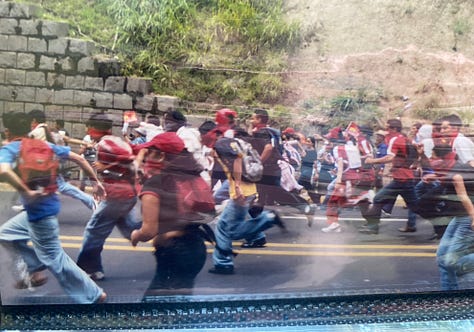
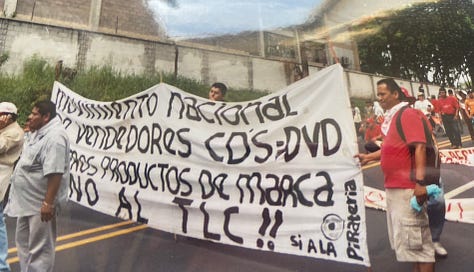
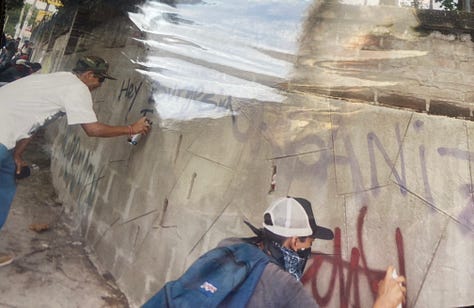
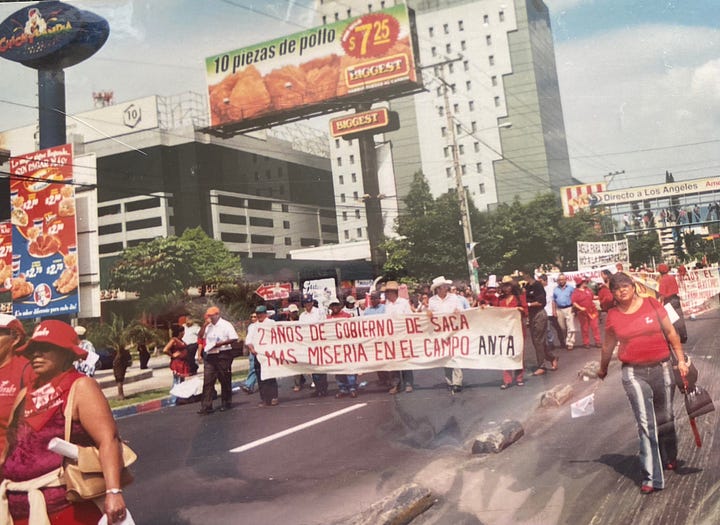
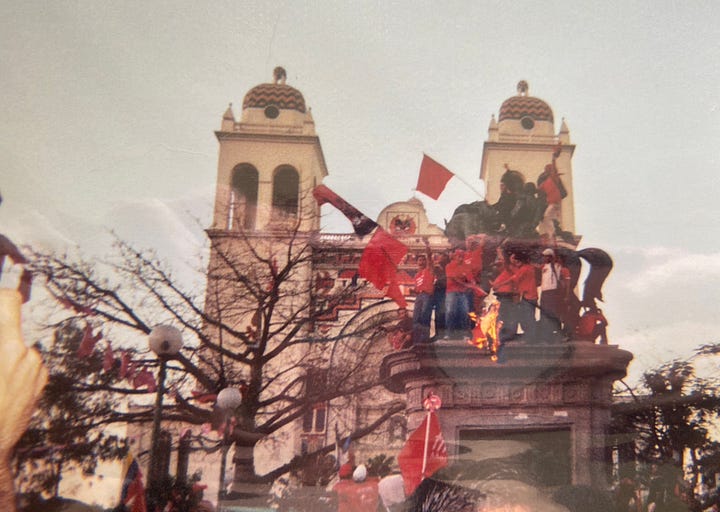
If you’re new here and haven’t been reading Lazo Magazine, we’ve recently had pieces from Colombia, Luxembourg, and Afghanistan. I’m trying to grow this tiny independent online publication, so please support us in any way you can. That could be by becoming a paid subscriber to this newsletter, donating to Lazo here, or just reading the website and sharing some of our articles online. Lazo Magazine is also on social media. You can follow along on Facebook, Twitter, LinkedIn, and Instagram.
What I’m writing:
• I looked at why Nayib Bukele’s El Salvador is such an attractive place for President Trump to send deportees. This story is unlocked and free to read.
My weekly news blurbs:
What I’m reading:
• A car bombing in Moscow killed General Yaroslav Moskalik, a high-ranking general in the Russian army, Reuters reports.
• European allies of the United States have been trying to convince President Trump of the virtues of a shared approach toward ending the war in Ukraine, to enhance leverage on both Moscow and Kyiv and to preserve European security, the New York Times reports.
• Ukrainian and European officials pushed back against some U.S. proposals on how to end Russia's war in Ukraine, making counterproposals on issues from territory to sanctions, according to the full texts of the proposals seen by Reuters.
• The Trump administration vacated a Congress-created position responsible for gathering intelligence on Russian atrocities committed in Ukraine, the Washington Post reports. That position was created by legislation co-written by former congressman Michael Waltz, now President Donald Trump’s national security adviser.
• Reuters reports that Russian banks have set up a netting payments system dubbed the "China Track" for transactions with China to reduce the payments’ visibility to Western regulators.
• Serbian student protesters on bicycles met European lawmakers in Strasbourg, the seat of the European Parliament, after a 13-day bike journey from the city of Novi Sad, Balkan Insight reports.
• Bosnian state security officers unsuccessfully tried to arrest Milorad Dodik, the pro-Russian leader of the Republika Srpska entity, the Associated Press reports. Bosnian courts issued an arrest warrant for Dodik in March in connection with his separatist policies.
• Viktor Orban’s hard-right government amended Hungary’s constitution to allow the suspension of the citizenship of dual nationals deemed to be “acting in the interests of a foreign power or a foreign organization”, Balkan Insight reports.
• Spain announced plans to meet the NATO target of 2 percent of GDP expenditure on defense by the end of the year, Politico Europe reports. Citing the “rapidly evolving geopolitical and economic context,” Prime Minister Pedro Sánchez said the country, which is among NATO’s lowest defense spenders, would increase its total military expenditure this year to around €34 billion.
• The Center for European Reform has an article on France and Romania and whether far-right candidates should be banned from running for office.
• The European Commission issued multi-million euro penalties against tech giants Apple and Meta, Politico Europe reports.
• The United Nations Office on Drugs and Crime said in a report that criminal networks behind the multibillion-dollar cyber scam industry that emerged in Southeast Asia are expanding globally to South America and Africa.
• Israeli Prime Minister Benjamin Netanyahu repeatedly pressed Ronen Bar, the head of Israel's Shin Bet intelligence agency, to spy on Israeli citizens who led and funded anti-government protests, and demanded personal loyalty above the rulings of the Israeli Supreme Court, the New York Times reports, citing a recent court affidavit.
• In an unprecedented set of remarks, Palestinian Authority President Mahmoud Abbas called on Hamas to release the hostages to block Israel’s justifications for the “genocide that the Gaza Strip is being subjected to.” CNN has the story.
• Militants killed at least 26 tourists and injured 17 in the deadliest attack against civilians in the India-administered region of Kashmir in years, Reuters reports. A little-known “Kashmir Resistance” group claimed responsibility for the attack.
• Two decades after becoming a democratic republic, Nepal is experiencing renewed calls for the return of the monarchy, along with demands to restore a Hindu state, New Lines Magazine reports.
• Myanmar’s military junta extended a temporary ceasefire in its conflict with rebels to April 30 to expedite earthquake relief and rebuilding efforts, Reuters reports. Sources later said the Myanmar junta continued its military campaign against opposition armed groups despite announcing a ceasefire.
• Pakistan deported over 19,500 Afghans so far this month, part of more than 80,000 who have left the country ahead of a 30 April deadline, the BBC reports.
• The Democratic Republic of Congo suspended former President Joseph Kabila’s political party and ordered the seizure of his assets, accusing him of supporting Rwandan-backed rebel groups in the country’s eastern region, Reuters reports.
• The Trump administration told senior U.S. diplomats in Vietnam not to take part in events marking the 50th anniversary of the end of the war, the New York Times reports.
• DOGE is shutting down the Millennium Challenge Corporation, a Congress-established bipartisan foreign aid agency that partners with developing countries to promote economic growth, Politico reports.
You can write to me for any reason: c.maza@protonmail.com.








